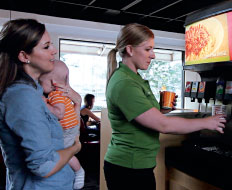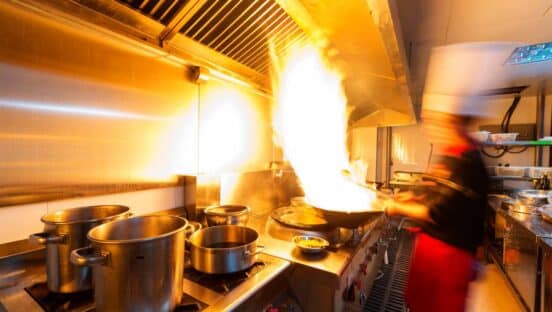It’s noon on a weekday and the town’s fast-casual hot spot is hopping, with customers lined up past the front doors. When the manager sees the massive crowd, one question comes rushing to his mind: How can we keep all of these patrons at our restaurant?
Quick serves and fast casuals alike are faced with this predicament on a daily basis. Some seek to fix the problem by increasing kitchen speed or using new technologies to pick up the pace, while others are forced to turn customers away. A few brands, however, are trying their hand with a new approach, one that is often untapped in the limited-service industry: enhancing in-store customer service by employing an extra, jack-of-all-trades staff member.
At a time when many quick-serve and fast-casual segments are scaling back on the number of employees, these concepts go against the grain by extending the work force to include a position that performs duties beyond essential restaurant responsibilities. Those responsibilities might include clearing tables and ushering guests to their seats or line busting in the drive-thru lanes.
McAlister’s Deli is one of the brands using the extra customer service–focused employee. “Typically, in order to grow your sales, you may have to increase your service,” says Frank Paci, McAlister’s Deli president and CEO. “Also, if your sales grow and you don’t add additional labor, you can actually put a cap on the business. So the way we’ve looked at it is strategically investing in labor to grow your sales.”
When the economy began recovering from the 2008 recession, Italian chain Fazoli’s decided to add service beyond the point of sale. CEO Carl Howard says it was one of the best decisions the brand has ever made. “My philosophy has always been that I could win on two qualities: service and hospitality,” he says. “Foodservice and hospitality will be able to earn share from my competitors and also give me pricing elasticity moving forward.”
Howard has led Fazoli’s transformation over the past few years into a more service-oriented brand. The staff now brings food to the guests’ tables and has an employee dedicated to breadstick duty, providing guests with bread and other services. In an effort to have best-in-class service, Howard says, the brand is in the process of yet another service initiative by adding a “guest ambassador”—the senior-most manager on duty who will be in the dining room instead of behind the counter.
“They are going to be up front greeting guests, opening doors, talking to tables, pre-bussing tables,” Howard says. “We’re going to act more like a casual-dining restaurant, even though we have a $6.50 price point.”
Despite successful industry examples like Fazoli’s, some quick-serve concepts are still wary of adding an extra level of service. “Having the right person with the right personality at the right time of day can more than pay out their cost,” says Gary Stibel, CEO of restaurant consulting firm New England Consulting Group. “But the wrong person will not only cost you extra money that restaurants can’t afford today, they can actually cost you guests.”
Some smaller concepts, especially those that are having trouble making ends meet, are afraid the risk of adding an extra customer service–oriented employee is simply not worth the reward, Stibel says. Howard says these businesses shouldn’t push the envelope unless the brand’s leadership and stakeholders feel confident in its decision. “You need to stay at or within the confines of the budget that you put together with your stock group or ownership group,” he says. “You can’t arbitrarily add expenses without expecting a positive impact to help improve the overall economics of the business, because your partners, your shareholders, or your franchisees won’t tolerate it.”
Stibel says even those brands with limited means can reap the benefits of additional customer service. He says restaurants can choose to use the extra man during the busiest times of the day.
“You don’t have to hire someone full time to be a host or hostess when the restaurant is empty half of the day,” he says. “What you need is somebody that has the ability to come out from behind the counter during busy times to actually engage guests who might otherwise grow impatient or be aggravated by wait times and slower service.”
A few brands, like McDonald’s and Chick-fil-A, have capitalized on the extra-man concept to alleviate the pressure of drive-thru traffic during the busiest times of the day. Chick-fil-A places an employee outside to personalize the drive-thru experience, assist with orders, and quickly resolve customer concerns.
To guarantee that the extra person is helping rather than hurting the brand, Fazoli’s, McAlister’s, and Chick-fil-A have conducted focus groups and received customer feedback that encouraged them to continue to add to their customer-service aspect. During these focus-group discussions, McAlister’s found that its customers like that they can get in and out quickly but never feel rushed, Paci says.
“I think one of the reasons why they don’t feel rushed is because we’re coming to their table, offering drinks refills,” he says. “As a result, we are effectively sending them a signal that says, ‘Hey, you can stay as long as you like.’”
McAlister’s has always made customer service a priority, Paci says. The deli chain has continually made customer satisfaction a primary goal, which is one of the driving forces behind ramping up its service efforts with the extra man. “We [put] additional labor into the model, because we know that’s what will enable us to grow our sales,” Paci says. “Our service model is really one of the things that differentiates us, and in order to perform that, we’ve got to have the right labor in the store.”
Mark Moraitakis, Chick-fil-A’s hospitality and service design director, says the brand’s corporate administration receives a system-wide measurement of customer satisfaction to help them make decisions related to customer service. But he says the most exciting way to collect guest feedback is helping out in the stores, where he can witness the difference the extra man makes.
While working in a restaurant this past summer for Cow Appreciation Day—in which customers who dress up as the brand’s signature cow mascot receive free food—Moraitakis had a memorable conversation with a guest. “One customer smiled and said to me, ‘You see that young guy over there? I want to take him home and have him train my husband on how to do this stuff,’” he says.
When he sees the positive impact of one employee first-hand, Moraitakis says, it helps justify having the extra staff member available. But while Moraitakis says the extra man is valuable, he also believes training all employees to perform the extra man duties can benefit the restaurant even more. By encouraging all Chick-fil-A staff members to carry out additional service acts like offering drink refills, handing out mints, throwing away trash, and searching for customers’ lost items, the brand is able to generate more thorough and consistent customer service.
“We view it as every man,” Moraitakis says. “We try to equip and help our franchisees with tools that they can therefore train all of their team members on hospitality and how to treat guests above and beyond with honor, dignity, and respect. We’d like for everyone in the restaurant to be equipped with these skills, not just one or two.”
For brands that don’t have a strong customer-service component, Moraitakis says, the extra man is great place to start. “When you have folks looking at making the decision [to] invest in service or hospitality based on a balance sheet, a spreadsheet, they’re looking at the wrong metrics,” Moraitakis says. “I think that in general, treating people the way you want to be treated is a really good formula for success.”













